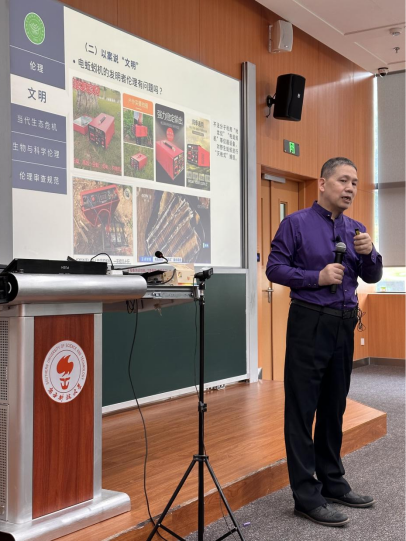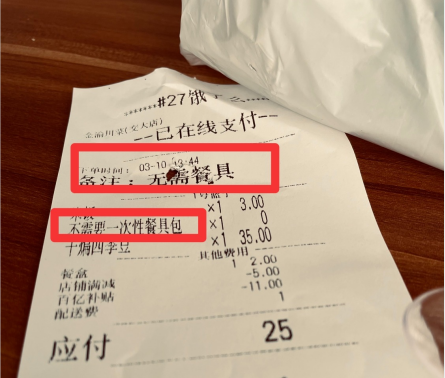On April 14, 2023, Dr. Zhou Jinfeng, the Secretary-General of the China Biodiversity Conservation and Green Development Foundation (CBCGDF), was invited to give the fifth lecture in the "Scientific Ethics and Technology Ethics Experts Lecture Series" at Southern University of Science and Technology in Shenzhen, China. His lecture was entitled "Contemporary Ecological Crisis and Environmental Ethics." The host of this lecture was Professor Tian Song from the Humanities and Social Science Center of Southern University of Science and Technology. The following is Dr. Zhou Jinfeng's discussion on food delivery and its environmental governance issues, as well as its relationship with ecological civilization. This article is translated by the International Department of the CBCGDF.


To understand today's environmental situation, we must first understand today's civilization, because civilization is the foundation of ethics.
Plastic pollution caused by food delivery has become a global environmental problem. If every order defaults to providing consumers with many disposable tableware items and does not allow consumers to choose "no," what should we do?
In 2016, I often ordered food delivery in my office to save time and improve work efficiency. As environmentalists, we use our own tableware instead of the disposable tableware provided by the restaurant, so we requested that food delivery platforms not provide us with tableware. However, our request was rejected. As a result, we wrote letters to the CEOs of food delivery platforms and suggested that they add an option to their software for "no disposable tableware."
But even after we wrote letters and published articles, the response was still the same: Sorry, it is not possible. So, what should we do?
This forced us as environmental organizations to sue China's six largest food delivery platforms, including Meituan and Eleme. We also sued KFC and McDonald's. However, the court refused to accept the cases after we sued. The judge consulted the State Administration for Market Regulation and received feedback that "there’s nothing wrong for food delivery to defaultly sending one-time-use tableware. On the contrary, it is not good to not provide tableware, as it is not feasible for customers to eat with their hands." Therefore, at that time, "food delivery defaulting to providing consumers with disposable tableware" was not wrong, and it did not violate laws, ethics, morality, and common sense.
Later, the CBCGDF organized discussions among experts and scholars. We also had meetings with colleagues from the court. Our reasoning was that we are in a different era of environment and civilization now. In today's ecological civilization era, we have the "Environmental Protection Law," which clearly stipulates that "no individual or organisation is allowed to damage the environment or waste resources". Let's take a look at these disposable tableware items. Do they cause environmental damage? Do they waste resources? It may not seem so on the surface. However, in the process of producing these disposable tableware items, resources must be used, and environmental costs must be paid. Therefore, we proposed that these tableware items should be given to those who need them. They should not be defaulting options; otherwise, they will cause a lot of waste.
Through our series of initiatives, seminars, and promotion, the court eventually decided to accept the cases. Ironically, those food delivery companies which had refused to provide the "no disposable tableware" option to customers no matter how we persuaded them, immediately updated their APPs and websites within 24 hours shortly after the court accepted our environmental public interest litigations, adding the option for consumers to choose not to receive disposable tableware.
This is what we advocate for as "respecting consumers' green consumption rights", which is also an important milestone in public-driven environmental governance.
Today, everyone can see that on the food delivery platforms used by consumers, there is an option where you, as a consumer, can choose "I do not want disposable tableware". This option is the result of the environmental public interest litigation that we brought up. How big is its impact? Let's do some calculations. According to data statistics, as of the end of 2021, the total number of food delivery orders nationwide reached 17.12 billion, with a transaction volume of 835.2 billion yuan and a user scale of nearly 500 million people. Even if only 10% of consumers choose "no disposable tableware", it is still a huge achievement for environmental protection.
Therefore, through the promotion of Chinese social organizations, the "no disposable tableware" option provided by food delivery platforms embodies a new moral, new concept, and new ethical change.
From this case, we can also see that moral judgments are time-bound. When we mentioned "food delivery should not actively provide disposable tableware" in 2017, this statement was not understood at the time. However, today, this statement has been widely accepted and recognized by the vast majority of people and mainstream ideas. Moreover, it has gone from "ethics" to "law" today. Some cities in China have already established regulations that explicitly state that food delivery services should not actively provide disposable tableware.
This case shows the transformation of civilization. Such changes can only occur in the era of ecological civilization.
Reporter: Daisy
Translator: CBCGDF
Editor: Daisy
Contact: v10@cbcgdf.org; +8617319454776

Contribution
Do you know? CBCGDF is a non-profit organization. We rely on crowd-funding and donations. You have the opportunity to help us to advance biodiversity conservation. Donate TODAY to power up the movement to make it a better world for all life.
https://www.paypal.me/CBCGDFChina
http://www.cbcgdf.org/English/ConfirmDonaTion/0.html
